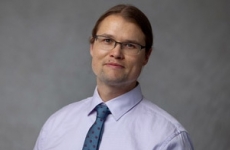
Erik Brodt, MD, receives a five-year, $975,000 federal grant to attract more American Indian students to health careers.
MADISON, Wis. — The relatively young Native American Center for Health Professions (NACHP), tucked among a few cubicles on the University of Wisconsin-Madison campus is worth celebrating, according to the UW System Board of Regents.
Dr. Erik Brodt has accepted the 2015 Board of Regents Diversity Award for his dedicated service to Native American communities in Wisconsin as an advocate, scholar and leader. Brodt, the director of NACHP and assistant professor of family medicine at the UW School of Medicine and Public Health (SMPH), established the center in 2012 and has since made quick moves to collaborate with like-minded programs and leaders around campus and among Wisconsin’s Native communities.
“NACHP believes that it will improve Native health and wellness by increasing Native voice across all elements of health professions,” said Brodt. “If you’re an educator, involved in policy, in a leadership position, if you have a clinical practice — if we have more Native voices in all the health professional realms, it’s going to improve Native health and wellness.”
One of the highlights noted by the Regents was the recent Indians Into Medicine grant obtained by NACHP, a five-year, $975,000 grant to recruit, train, and nurture American Indian students along the educational continuum to increase the number of Native Americans in health professions. The program reaches middle and high school as well as college-age students. Through the grant, NACHP is partnering with five of Wisconsin’s tribal communities to support the grant.
In addition, NACHP is revising its early advisory council made up of interested faculty and replacing it with a tribal advisory council. The new council will consist of the Indians Into Medicine grant tribal community partners.
NACHP is also collaborating with current UW enrichment programs, such as the Pre-College Enrichment Opportunity Program for Learning Excellence (PEOPLE) and the Tribal Technology Institute (TTI). These types of partnerships, according to Brodt, have made NACHP what it is today.
“We’ve been able to make extremely efficient use of resources because we collaborate with people,” he said. “We recognize that we don’t have all the resources and best ideas to accomplish what we want, but if we’re able to team up with other people … we’re able to come together to make some pretty awesome stuff happen.”
Another point of pride for NACHP is We Are Healers, an online video library profiling Native health professionals. NACHP just recently launched the site, which contains three videos that act as “digital role models” for tribal communities, at www.WeAreHealers.org. Brodt previewed several of the videos at a professional conference, and they’ve since garnered some significant attention and praise.
“It was amazing to play the videos we’ve produced and get an ovation from a crowd that typically doesn’t clap after a talk,” said Brodt. “It was a very humbling experience and very affirming for us, letting us know we’re on the right path.”
NACHP is also increasing opportunities for current Native medical students here at the UW through Native-focused curriculum and outreach opportunities in tribal communities. Through a partnership with North Dakota State University, NACHP will bring the nation’s only program in American Indian Public Health to UW students through distance learning.
Also prompting excitement within the school, two fourth-year med students will spend the fall semester at the Oneida Clinic in a preceptorship, a supervised training period that takes place in a community away from their school.
“This will be the first time our students will have the opportunity to do their preceptorship at a tribal clinic,” said Melissa Greendeer, NACHP’s academic support coordinator. “They’ll be hosted by tribal families who also work at the clinic with the hope that these students will be able to engage in the community beyond the clinic.”
Brodt thanked Dr. Robert N. Golden, dean of the SMPH; Dr. Liz Petty, senior associate dean of academic affairs at the SMPH; Rick Moss, senior associate dean of basic research, biotechnology and graduate education at the SMPH; Greendeer; Tim Frandy, folklorist and NACHP outreach specialist; Lauren Hoeft, NACHP program specialist; Caitlin LeValley, health equity outcomes specialist at the Collaborative Center for Health Equity; Christine Athmann, assistant professor of family medicine; the tribal communities of Wisconsin; and many others for their support of NACHP along the way.
“I think a lot of the stuff I’ve done throughout my life and career has been through team efforts, bringing people together to do something that they all are passionate and excited about,” said Brodt. “I’m receiving the award, but I see myself as an ambassador of NACHP and of the School.”
Published: February 12, 2015
